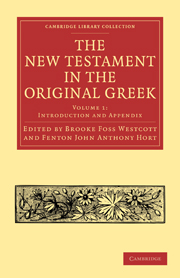III - APPLICATION OF PRINCIPLES OF CRITICISM TO THE TEXT OF THE NEW TESTAMENT
Published online by Cambridge University Press: 29 August 2010
Summary
96. The principles of criticism explained in the foregoing section hold good for all ancient texts preserved in a plurality of documents. In dealing with the text of the New Testament no new principle whatever is needed or legitimate : but no other ancient text admits of so full and extensive application of all the various means of discriminating original from erroneous readings which have been suggested to scholars by study of the conditions of textual transmission. On the one hand the New Testament, as compared with the rest of ancient literature, needs peculiarly vigilant and patient handling on account of the intricacy of evidence due to the unexampled amount and antiquity of mixture of different texts, from which few even of the better documents are free. On the other it has unique advantages in the abundance, the antiquity, and above all in the variety of its documentary evidence, a characteristic specially favourable to the tracing of genealogical order.
CHAPTER I. PRELIMINARY CHRONOLOGICAL SURVEY OF DOCUMENTS
97. Before entering on the historical phenomena of the text itself, and the relations between its principal documents, we think it best to interpose a short general survey of the written evidence with which all criticism has to deal, presenting it in a form somewhat different from that of the detailed catalogues which it is the office of other books to supply.
- Type
- Chapter
- Information
- The New Testament in the Original Greek , pp. 73 - 287Publisher: Cambridge University PressPrint publication year: 2010First published in: 1881



